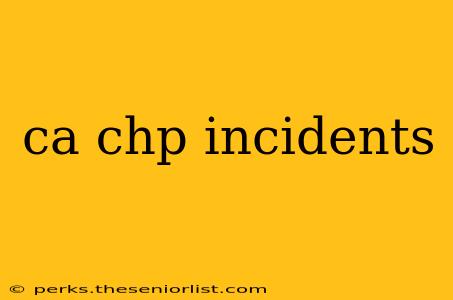When it comes to road safety and enforcement in California, the California Highway Patrol (CHP) plays a crucial role. Their responsibilities extend beyond just enforcing traffic laws; they are the guardians of our highways, ensuring that every traveler can journey safely. In this article, we’ll delve into what CHP incidents are, the types of incidents they respond to, and how they affect us as motorists.
What Are CHP Incidents?
CHP incidents refer to events on the highway that require the attention of the California Highway Patrol. These can range from accidents and traffic violations to more serious situations like criminal activity or emergencies. Think of them as the unexpected thunderstorms that disrupt your travel plans; while they can be troublesome, they're essential for keeping the roads safe.
Common Types of CHP Incidents
CHP officers respond to various incidents on California highways. Here are the most common types:
-
Traffic Accidents:
- These include minor fender benders to major collisions, often requiring medical assistance and accident investigation.
-
DUI Checkpoints:
- To curb impaired driving, CHP sets up checkpoints where officers test drivers for sobriety.
-
Road Closures:
- Whether due to accidents, maintenance, or natural disasters like mudslides, CHP manages traffic flow around these areas.
-
Public Assistance:
- When motorists need help—like a flat tire or running out of gas—CHP often lends a hand.
-
Criminal Activity:
- Officers may respond to cases of theft, vehicle pursuits, or other crimes happening on the highways.
How CHP Incidents Affect Motorists
CHP incidents can significantly impact drivers, whether it's through delays or heightened security measures. Here’s how they can affect your experience on the road:
-
Traffic Delays: Just like a slow-moving river can hold back water, accidents and road closures can create bottlenecks on highways. Expect delays if you're near an incident scene.
-
Safety Awareness: Every incident serves as a reminder to remain vigilant and follow traffic laws. The presence of CHP often acts like a lighthouse guiding sailors safely to shore.
-
Legal Implications: If you're involved in a CHP incident, understanding your legal rights and responsibilities is vital. Always consult with a legal expert if needed.
What to Do During a CHP Incident
If you find yourself near a CHP incident, here are some tips to navigate the situation safely:
-
Stay Calm: Like a steady hand when steering through rough waters, maintaining composure is crucial.
-
Follow Instructions: Listen to CHP officers on-site. They are there to ensure everyone’s safety.
-
Remain in Your Vehicle: If stopped, it's best to stay inside your vehicle unless instructed otherwise.
-
Be Patient: Just as a tree must bend in a storm, be flexible with your plans. Traffic will eventually clear up.
Conclusion
Understanding CHP incidents helps us appreciate the hard work and dedication of the California Highway Patrol. They are more than enforcers; they are protectors of our highways. By being aware of the types of incidents they handle and knowing how to react during such events, we can all contribute to making California roads safer.
For more information on road safety and best practices while driving, check out our article on Safe Driving Tips for California Motorists or Understanding Traffic Laws.
By being informed and prepared, you can navigate the highways of California with confidence, knowing that the CHP is watching out for your safety.
